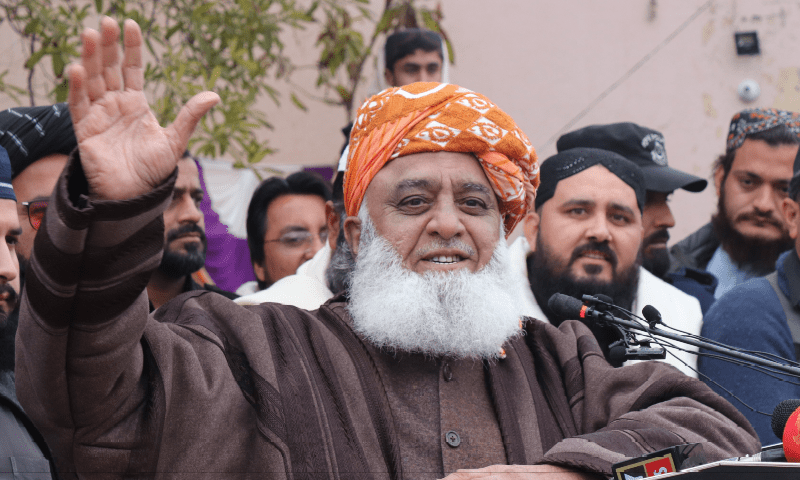In a significant political development, Maulana has officially joined a major political alliance, adding weight to its ranks and signaling a shift in the political landscape. This strategic move is set to have lasting effects, as Maulana’s decision could bolster the coalition’s position in the upcoming elections. With his influence and grassroots support, this addition has the potential to sway both public opinion and political dynamics.
The Importance of Maulana’s Political Shift
Maulana, a well-respected figure in Pakistan’s political sphere, has long been a leader with substantial influence, particularly within religious and conservative circles. By joining a political alliance, he aligns himself with a coalition that shares similar values and goals, potentially amplifying his reach. This move is widely seen as a calculated strategy to strengthen the coalition’s position and increase its chances of success in the 2024 elections.
Maulana’s Influence in Pakistani Politics
For years, Maulana has been a significant force in Pakistan’s political scene, known for his ability to mobilize large numbers of supporters. His joining a political alliance signals not only a personal commitment to the coalition but also a stronger unified front against rival political factions. His support base, which spans across various provinces, could be a game-changer in the upcoming electoral battle.
His influence is particularly important in areas where religious and conservative ideologies hold substantial sway. With his endorsement, the coalition is likely to benefit from increased voter engagement and support in these regions, further solidifying its position in the political race.
The Strategic Role of Political Alliances
In Pakistan’s multi-party system, political alliances are often the key to success. Forming coalitions allows smaller parties to pool resources, share political platforms, and challenge larger, more established parties. Maulana’s decision to join this particular alliance could act as a catalyst for other political figures to consider similar moves, thus shaping the political strategy for the upcoming elections.
Maulana’s joining could also be seen as a response to the shifting political dynamics in the country, as he seeks to align with a group that reflects his views and has the potential to deliver on key issues. His political acumen suggests that his alliance could bring strategic advantages, both in terms of public perception and in actual electoral outcomes.
Impact on the Coalition’s Electoral Strategy
The addition of Maulana is likely to strengthen the alliance’s electoral strategy ahead of the 2024 elections. His presence in the coalition could allow for more cohesive campaign messaging, attracting voters who value religious and conservative ideologies. Additionally, his involvement may help solidify the coalition’s stance on critical issues such as economic reform, national security, and religious freedoms, which are key concerns for many Pakistanis.
Moreover, Maulana’s political move could provide much-needed support in crucial constituencies. With his experience and networks, he may be able to help the coalition broaden its base, especially in areas where other parties have struggled to gain traction. His ability to rally supporters could serve as a strong motivator for other potential coalition members to join, thereby expanding the alliance further.
Reactions from Political Opponents
As expected, Maulana’s move has elicited reactions from political rivals, many of whom are critical of his decision to join the coalition. Opponents argue that such alliances often lead to compromise and may dilute individual party platforms. However, this argument does not seem to have deterred Maulana, who remains steadfast in his belief that this union will benefit his supporters and the larger political landscape.
Rival parties are now under pressure to either strengthen their own alliances or find ways to counter Maulana’s influence in the coming months. This could lead to increased political maneuvering, as parties vie for control over key voter blocks, and prepare for what promises to be a heated electoral battle.
Looking Ahead to the 2024 Elections
With Maulana’s political shift, the stakes for the upcoming 2024 general elections in Pakistan have just been raised. The alliance he has joined now stands as a more formidable competitor, bolstered by his influence and ability to sway public opinion. As election season draws closer, political analysts will be watching closely to see how this coalition develops and what role Maulana plays in shaping its platform.
In the meantime, the move highlights the importance of strategic political decisions in a country where alliances and public perception can determine electoral outcomes. Maulana’s entry into the coalition not only enhances its appeal to voters but also reflects a broader trend in Pakistan’s political system, where unity among smaller parties can prove essential to securing power.
Conclusion
Maulana’s decision to join a political alliance in Pakistan is a key development that will likely have significant implications for both his career and the future of the political coalition. His support can help energize voters, bolster the coalition’s position in key constituencies, and offer a more unified approach to addressing the nation’s pressing issues. As the 2024 elections approach, political observers will undoubtedly keep a close eye on how Maulana’s influence plays out and whether it leads to tangible electoral success for his new political allies.



Comments (0)
No comments yet. Be the first to comment!
Leave a Comment